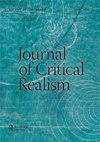Building on the shoulders of Bhaskar and Matthews: a critical realist criminology
IF 2.9
0 PHILOSOPHY
引用次数: 2
Abstract
ABSTRACT Building on the insights of the late Roy Bhaskar and the late Roger Matthews, as well as some recent developments in ultra-realist criminology, this article introduces and delineates some core intellectual contours of a Critical Realist Criminology (CRC) based on the principles of: The ‘emergent,’ stratified ontology of crime and of the offender; the full critical realist account of the dialectics of being and becoming, including the spiritual turn in critical realism, applied to processes of criminal justice and reform; maximal inclusion of diverse theoretical research positions and the primacy of ontology in methodological selection; a ‘serious’ critical relationship of criminologists with professionals, institutions and policy-makers of criminal justice. These principles are directed at developing a criminology that ‘underlabours’ the recovery of human flourishing for the victims and perpetrators of crime and for society at large, including in-depth inquiry into what counts as crime and the purposes of incarceration.建立在巴斯卡和马修斯的肩膀上:一个批判的现实主义犯罪学
摘要本文基于已故的Roy Bhaskar和Roger Matthews的见解,以及超现实主义犯罪学的一些最新发展,介绍并描绘了批判现实主义犯罪学(CRC)的一些核心知识轮廓,其原则是:犯罪和罪犯的“涌现”分层本体论;对存在与形成辩证法的全面批判现实主义描述,包括批判现实主义的精神转向,适用于刑事司法和改革进程;最大限度地包容不同的理论研究立场和本体论在方法选择中的首要地位;犯罪学家与刑事司法专业人员、机构和决策者之间的“严肃”批判性关系。这些原则旨在发展一种犯罪学,为犯罪受害者和犯罪者以及整个社会“奠定”恢复人类繁荣的基础,包括深入调查什么是犯罪和监禁的目的。
本文章由计算机程序翻译,如有差异,请以英文原文为准。
求助全文
约1分钟内获得全文
求助全文

 求助内容:
求助内容: 应助结果提醒方式:
应助结果提醒方式:


